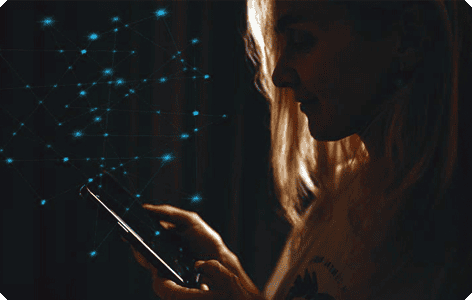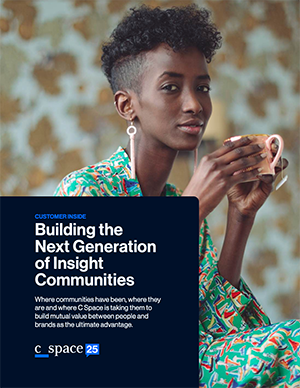This article is part of a year-long, 25th anniversary series that explores where insight communities have been, where they are today, and the market and customer trends that are shaping where C Space is taking insight communities next.

Since the Orphan Drug Act passed in 1983, awareness and investment in rare disease treatments have grown, but for many patients, the journey is still challenging. Globally, around 300 million people live with a rare disease. Most face delayed diagnoses, limited treatment options and a lack of support as they figure out how to find the information they need, pay for treatments and navigate the uncertain road ahead.
Despite the pressing need to hear from them, rare disease patients are often excluded from traditional healthcare market research. In many cases, this is due to cost implications or the time it takes to recruit, making individual projects less practical for insight teams. At C Space, however, we specialize in creating custom longitudinal insight communities that offer life sciences companies the ability to invest in rare and underrepresented audience recruitment once and then reap the benefit of that many times over. Our approach is built for deep, ongoing engagement and input, not just one-off studies.
That’s why we’re especially effective at reaching and engaging patient populations whose voices are too often left out. And when it comes to rare disease research, these voices matter. Patients aren’t just participants. They’re partners in learning. We design research that reflects that partnership.
Despite the pressing need to hear from rare disease patients, they’re often excluded from traditional healthcare market research. But these voices matter. Patients aren’t just participants. They’re partners in learning. We design research that reflects that partnership.
Why our patient-centric approach to insight communities works:
We meet patients where they are. We work with advocacy groups and trusted online spaces where patients feel seen and supported. Partnering with these groups lends credibility during the recruitment process and encourages respondent participation.
We design research that fits seamlessly into everyday life. Remote interviews, asynchronous diaries and short check-ins make participation easier, even for those managing complex or unpredictable health needs.
We build long-term relationships that result in better outcomes. Our insight communities are designed to last, building trust over time and unlocking deeper human insight. The result is richer data, more meaningful engagement and better outcomes for companies, caregivers and, most importantly, patients.
Start with an insight community, but don’t stop there when engaging rare disease patients
Reaching rare disease patients starts with connection, not just quotas. Many of these patients already belong to advocacy organizations or online networks that provide trust and connection. These are powerful entry points, and we approach them with care, empathy and respect.
But we also go further. Our recruitment includes referrals from HCPs, peer-to-peer outreach and traditional healthcare market research panels, depending on the needs of the study. Every community, condition and individual is different, and we tailor our patient research strategy accordingly.
Speak like a human, not a brand, to create meaningful patient partnerships
Many patients have spent years feeling overlooked or misunderstood. The last thing they need is corporate jargon. We make sure our communication is always clear, honest and respectful. We explain what we’re doing, why it matters and how their voices will be heard. We welcome questions, invite feedback and make space for concerns.
Empathy isn’t a courtesy. It’s the foundation for the long-term partnerships we build.
Design around people, not protocols, for deeper engagement in rare disease studies
What sets C Space apart is not just who we reach, but how we engage with target audiences. Whether patients connect with us through a doctor, a peer, or a panel, we focus on building long-term, meaningful relationships, not just completing a study. This is where the “Evolutionary Learnings” in C Space’s Customer Inside: Building the Next Generation of Insight Communities guide truly come to life – and we take them one step further with rare disease patients.
Think about people rather than participants in rare disease research
Traditional research models in the pharma industry often don’t fit the realities of living with a rare disease. People may be managing fatigue, pain, mobility issues, or caregiving responsibilities.
This may involve functional elements such as designing activities to be mobile first, optimizing UX/UI, or sending push notification rather than emails. Our community experts allow members to contribute anonymously or send their answers directly to the moderator for more sensitive topics. We make sure that we understand the challenges and implications of the disease state we are focused on. Our research is flexible by design. That might mean asynchronous participation, shorter sessions, or letting people engage on their own schedule. Making these small shifts lead to more authentic responses and richer patient insights.
Design for two-way, mutual value exchange in online patient communities
Bring community members into the context of real challenges at the beginning of a research project and share the impact of their contributions afterward. In coordination with our clients, we proactively share information back with the community to help foster learning and ongoing engagement and to demonstrate that the work they are doing has meaning. Because members feel so comfortable in the online community space, they bring up pertinent insights organically – and we actively listen and learn from them. We offer fair compensation and always respect our participants’ time and energy. Because accessibility and equity go hand in hand.
Lead with people-first interactions for deeper patient engagement
Our high-touch-point facilitation style and commitment to building strong relationships help create trust and improve the market research we conduct. Our patients feel a connection to our facilitators and are more open to share deeper emotions.
Engage with empathy and follow through in rare disease research
A common frustration in rare disease communities is participating in research and never hearing back.
That’s why in our longitudinal insight communities, we close the loop. We share findings when we can. We say thank you. We let participants know how their input made a difference.
Empathy isn’t just how we show up. It’s a core practice that shapes everything we do.
Why patient-centered rare disease research matters and what comes next
Patients with rare diseases carry hard-earned knowledge. They live at the edge of innovation, and when we take the time to truly listen, we uncover insights that can’t be found anywhere else. C Space’s custom private insight communities create real human connection over time, helping us engage rare and underrepresented audiences in ways that lead to better understanding and better outcomes. Meaningful engagement takes more than good intentions. It takes the right approach – one that’s flexible, human and focused on lasting relationships. This is our strength. We help healthcare organizations gain powerful insights through thoughtful, long-term community partnerships.
Planning your next patient research project? Let’s connect. We’d love to help you create a more human, more impactful experience.






